Akmataliev Adds World Gold to Impressive Resume
Saturday, November 6, 2021 - 21:53 By Vinay Siwach

BELGRADE, Serbia (November 6) – Last time Vazgen TEVANYAN (ARM) was in Belgrade, he shot to prominence with a gold medal performance at the Individual World Cup.
But there was no fairytale ending Saturday as Ernazar AKMATALIEV (KGZ) upgraded his senior World Championships silver to gold at the U23 Worlds in the Serbian capital, continuing to become one of the most exciting wrestlers around the world.
“The gold is better than silver [in Oslo],” Akmataliev said. “Even though I lost in Oslo I am thankful to God. I won the gold because we waited and prepared for this a lot. Not only us but the whole Kyrgyzstan [waited for this].”
His 10-2 win was perhaps the highlight of the five freestyle finals that were held on day six of the tournament. Azerbaijan, Greece, Russia and Iran won one gold medal each with five more to be decided Sunday.
But the high-profile 70kg final between the two superstars lived up to the billing as Tevanyan managed to keep the Kyrgyz star silent for the first period. He began a double-leg attack to expose Akmataliev and get two points. But the Kyrgyz wrestler was also awarded two for putting Tevanyan in danger.
Just before the end of the first period, Akmateliev scored a stepout to lead 3-2 at the break. It was also the first sign of Tevanyan slowing down.
A minute into the second period, Akmateliev scored another stepout. In the next minute and a half, he scored two more stepouts and Tevanyan was finding it exceedingly difficult to break his opponent's defense.
He made a final burst of energy with a duck-under but Akmateliev was quick to turn it into a takedown and gut which gave him the 10-2 win.
“We were prepared for the final and everything went according to our plan,” he said. “I am happy that the tactics that we choose worked.”
Born in the Naryn region of Kyrgyzstan, Akmataliev shocked the world when he pinned Ilyas BEKBULATOV (UZB) at the Asian Olympic Qualifiers in Almaty earlier this year.
Life has only looked upward since then as he made his Olympic debut. He, however, could not win a medal in Tokyo. But that experience helped him iron out the flaws.
“After I won against Bekbulatov, I got more supporters not only from Kyrgyzstan but other countries as well,” he said. “I prepared for the Olympics but destiny was not there for me in Tokyo. But thank god now I have good results. I learned a good lesson there We had prepared a lot and I was in good shape both mentally and physically. But after Belgrade win, I will prepare harder to get more medals.”
The 22-year-old, who finished fifth at the last U23 Worlds, won the silver in Oslo and now the gold in Belgrade at 70kg and will have to decide to wrestle at an Olympic weight for Paris.
“We have not decided yet [about the Olympic weight 65kg to 74kg]. It will be on the coaches to decide in which weight I can win,” he said.
But he joins a list of Kyrgyzstan stars who have won a World Championships including two-time world champion Aisuluu TYNYBEKOVA (KGZ).

The nation could have won two gold medals in the night but Bekbolot MYRZANAZAR UULU (KGZ) suffered a heartbreaking 6-7 loss to Aliabbas RZAZADE (AZE) in the 57kg final.
In a dramatic final that saw Myrzanazar Uulu score two points in the final few seconds to tie it 6-6, it was Rzazde's four-point move in the second period that separated the winner.
The bout's opening scramble had the Kyrgyz wrestler scoring a takedown but two separate stepouts gave Rzazade two points as the first period ended 2-2.
Rzazade then strung together a series of attacks and scored a four-pointer and led 6-4. The final takedown from Myrzanazar Uulu gave him two points but that was not enough for the win. Despite a challenge from the corner, the review showed no extra points for him.
“I was sure that I won, even though there was a challenge,” Rzazade said.
Hailing from the same town as Jabrail HASANOV (AZE), Rzazade had no shortage of inspiration growing up and he wants to achieve Olympic medals like Hasanov and three-time world champion Haji ALIYEV (AZE).
“I won't change the weight category,” Rzazade said. “I'll get ready for the Paris Olympics in the same weight. Aliyev is a wrestler I look up to as well as Hasanov as we are from the same place, he helps me a lot as a coach.”

At 65kg, Georgios PILIDIS (GRE) finally won a gold medal at a World Championships as he had missed it twice before, falling in the 2015 and 2016 cadet Worlds final.
It seemed like he would be denied once again as he trailed Ibragim ABDURAKHMANOV (RUS) 2-3 with five seconds remaining in the gold medal bout but the referee called for a foul for a singlet grab which was not given initially but awarded to Pilidis after a challenge.
The 3-3 win for the Greek also gave his country the first-ever U23 world title.
“I had a plan for the final match,” Pilidis said. “I was going to let him lead for two or one points, and then make a comeback and score the points. I’ve done that many times and it works for me”
The youngster was at the Tokyo Olympics but he said that it was a forgettable experience for him and he doesn't take much pride in his performance.
“I don’t even want to think about the Olympics. I performed really badly. I made a lot of mistakes. Of course, I got some experience. After the Olympics, I wanted to wrestle somewhere else to prove myself.”

Russia survived a close final at 79kg as U23 European champion Ramazan SARI (TUR) suffered a 4-4 loss against Magomed MAGOMAEV (RUS).
After scoring the initial takedown, Magomaev gave one up and wrestles went 2-2 at the break with Sari holding criteria.
Magomaev began the second period with a takedown as well but was warned for passivity and gave up one point with a minute remaining. He gave up a step out with 15 seconds remaining but held the criteria at 4-4 at the end of the six minutes and win the gold at his debut World Championships.
“I didn’t expect the match would be so tough,” Magomaev said. “It was a huge responsibility on me as I couldn’t let down my family.”
Magomaev made the Russian U23 team after winning the nationals and he said that it was emotionally tougher to wrestle here than the nationals back home in October.
“I never wrestled the opponents before. I had to figure out this wrestling style during the matches,” he said.
Born in Dagestan, Russia, he moved to Orel for training when he was 11-years-old. At the start, he did not like the sport but winning the local tournaments kept him going. He now trains in Bryansk.
After the win, he performed the traditional 'Leginzka' dance to celebrate, a promise he had made to his friends before the final.
“One of my friends said that I should dance if I win,” he said. “I said deal. So, I won and I had to keep my promise.”

The final gold medal of the night went to Iran as Amirali AZARPIRA (IRI) controlled the 97kg final and defeated Radu LEFTER (MDA) 7-3.
He did give up a takedown but as Lefter began tiring out, Azarpira managed to pile on the points and win with ease.
“I was preparing for this gold medal before coming here,” Azarpira said. “The final was easy because we had it figured out.”
RESULTS
57kg
GOLD: Aliabbas RZAZADE (AZE) df Bekbolot MYRZANAZAR UULU (KGZ), 7-6
BRONZE: Manvel KHNDZRTSYAN (ARM) df Saurabh IGAVE (IND), 10-0
BRONZE: Ahmad MOHAMMADNEZHADJAVAN (IRI) df Dzmitry SHAMELA (BLR), 3-2
65kg
GOLD: Georgios PILIDIS (GRE) df Ibragim ABDURAKHMANOV (RUS), 4-3
BRONZE: Ziraddin BAYRAMOV (AZE) df Stilyan ILIEV (BUL), 10-0
BRONZE: Cavit ACAR (TUR) df Hrachya MARGARYAN (ARM), 4-2
70kg
GOLD: Ernazar AKMATALIEV (KGZ) df Vazgen TEVANYAN (ARM), 10-2
BRONZE: Aliakbar FAZLIKHALILI (IRI) df Murad EVLOEV (AZE), 5-4
BRONZE: Nicolai GRAHMEZ (MDA) df Cuneyt BUDAK (TUR), 5-2
79kg
GOLD: Magomed MAGOMAEV (RUS) df Ramazan SARI (TUR), 4-4
BRONZE: Ali SAVADKOUHI (IRI) df Ashraf ASHIROV (AZE), 8-2
BRONZE: Arman AVAGYAN (ARM) df Goga MAMIAURI (GEO), 4-4
97kg
GOLD: Amirali AZARPIRA (IRI) df Radu LEFTER (MDA), 7-3
BRONZE: Danylo STASIUK (UKR) df Milan KORCSOG (HUN), 4-2
BRONZE: Jonathan AIELLO (USA) df Vasil PAULIUCHENKA (BLR), 13-2

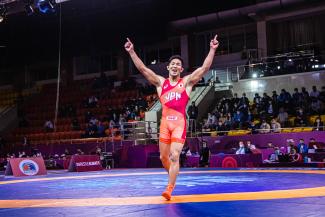
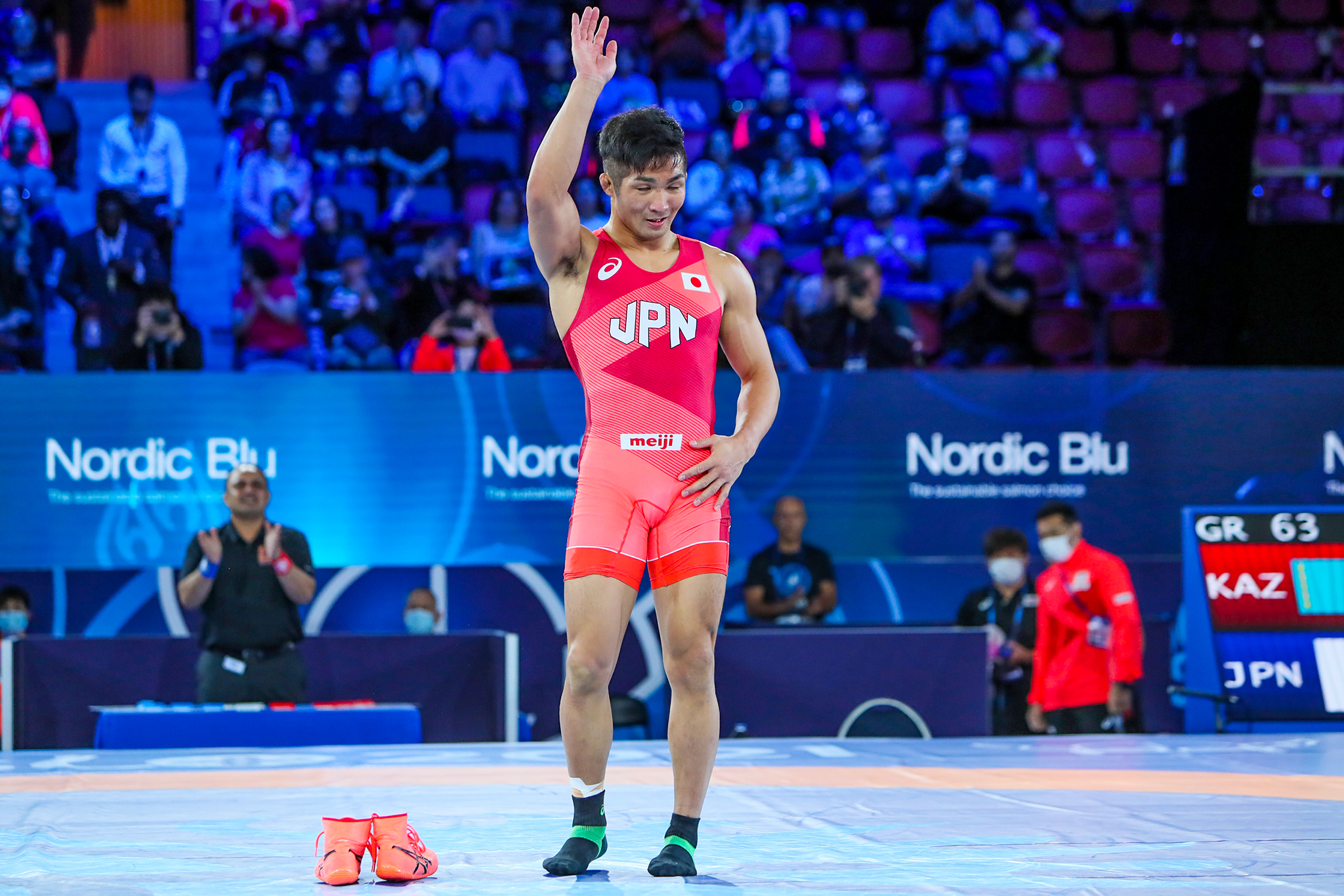 Tsuchika SHIMOYAMADA (AUS) had left his shoes on the mat during the 2021 World Championships to mark his retirement. (Photo: United World Wrestling / Martin Gabor)
Tsuchika SHIMOYAMADA (AUS) had left his shoes on the mat during the 2021 World Championships to mark his retirement. (Photo: United World Wrestling / Martin Gabor)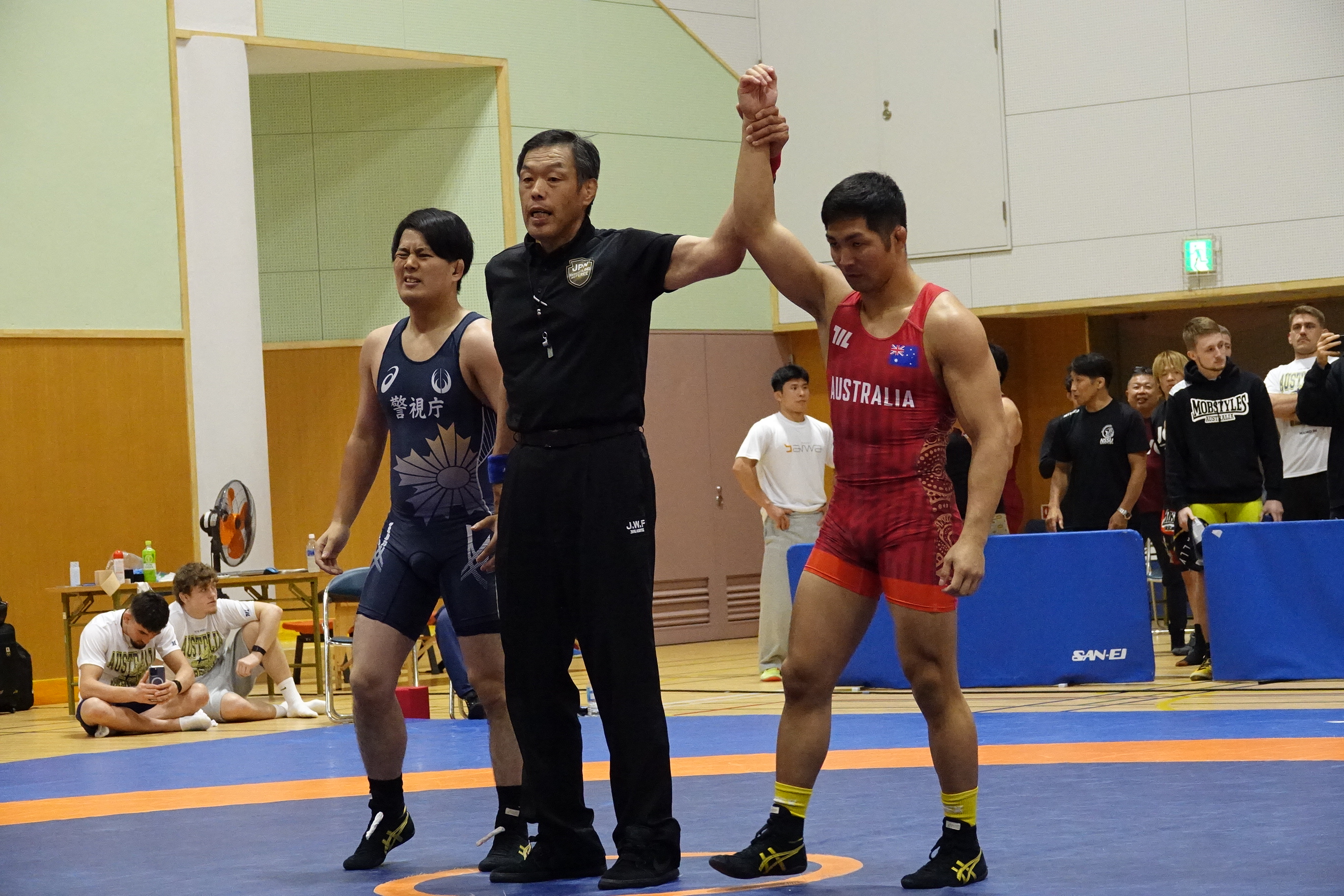 Tsuchika SHIMOYAMADA advances to the semifinals at the All-Japan Non-Student Championships in July with a 52-second win over Kokoro GOTO. (Photo: Koji Fuse / wrestling-spirits.jp)
Tsuchika SHIMOYAMADA advances to the semifinals at the All-Japan Non-Student Championships in July with a 52-second win over Kokoro GOTO. (Photo: Koji Fuse / wrestling-spirits.jp)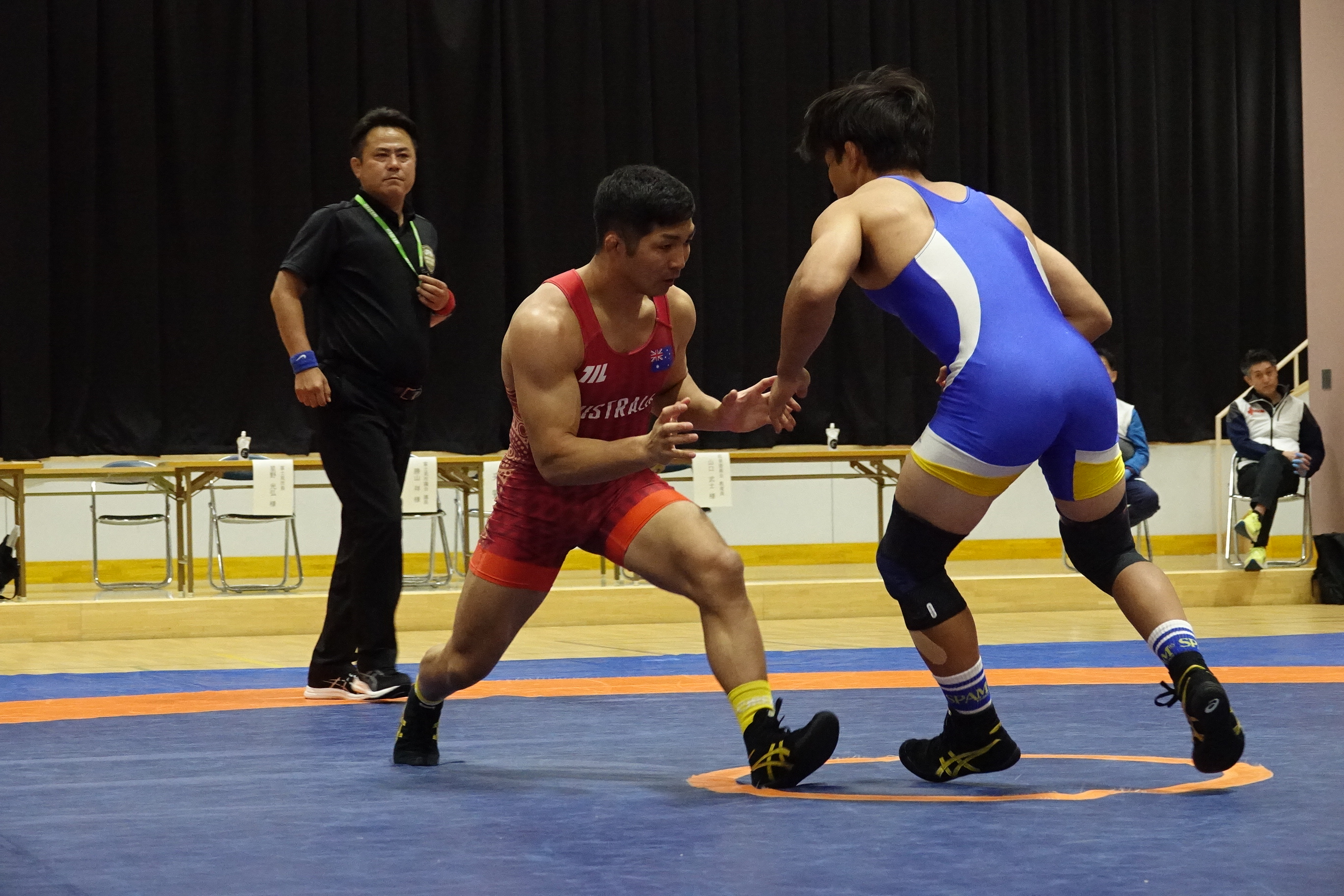 Tsuchika SHIMOYAMA faces Keitaro ONO in his opening match at the All-Japan Non-Student Championships in July. (Photo: Koji Fuse / wrestling-spirits.jp)
Tsuchika SHIMOYAMA faces Keitaro ONO in his opening match at the All-Japan Non-Student Championships in July. (Photo: Koji Fuse / wrestling-spirits.jp)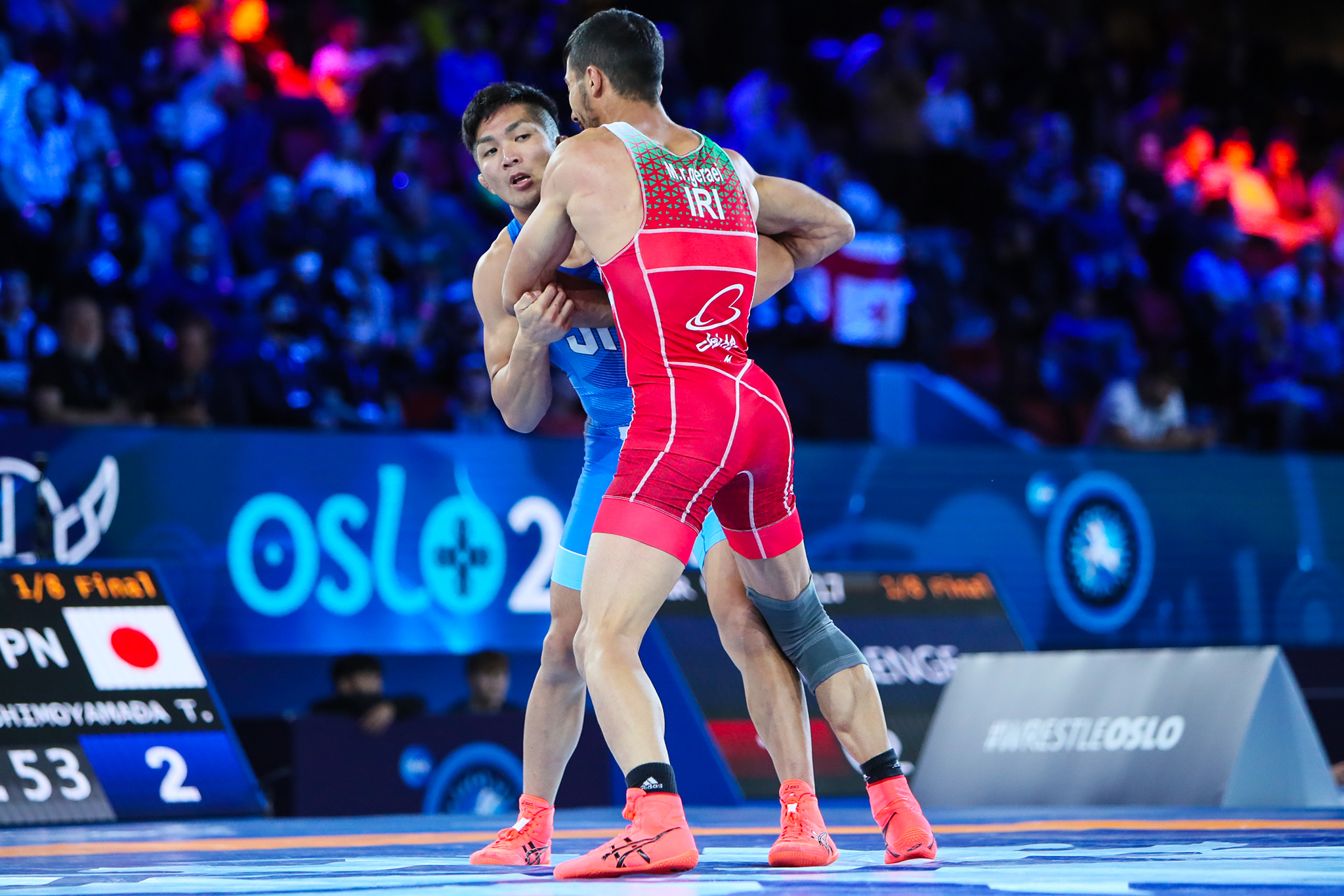 Tsuchika SHIMOYAMADA (AUS) was dominating Mohammadreza GERAEI (IRI) in their match at the 2021 World Championships before being pinned. (Photo: United World Wrestling / Martin Gabor)
Tsuchika SHIMOYAMADA (AUS) was dominating Mohammadreza GERAEI (IRI) in their match at the 2021 World Championships before being pinned. (Photo: United World Wrestling / Martin Gabor)
Share your thoughts.
Comments